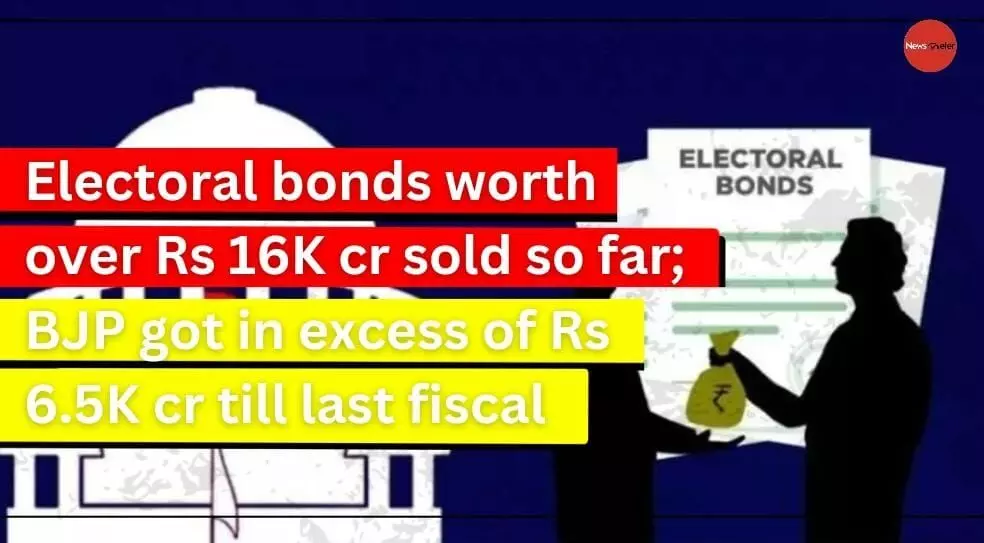Guide to understanding Electoral Bonds Scheme, its drawbacks to democracy
Electoral bond is a promissory note, no name of the buyer or payee, no ownership information recorded, political party is presumed to be its owner
By Sulogna Mehta
Hyderabad: In a much-anticipated verdict, the Supreme Court on Thursday scrapped the Electoral Bonds Scheme for political funding. But do you know what electoral bonds are and the role they play in financing the political machinery?
An electoral bond forms the core of the Electoral Bonds Scheme. It is a financial instrument to make donations to political parties and the term was first mentioned by finance minister Nirmala Sitharaman in the Union Budget 2017-18.
What is an electoral bond?
The scheme, introduced by the government on January 2, 2018, was pitched as an alternative to cash donations made to political parties as part of efforts to bring transparency in political funding.
According to the Electoral Bond Scheme, an electoral bond is issued as a promissory note, which is bearer in character i.e. it does not carry the name of the buyer or payee, no ownership information is recorded and the political party is presumed to be its owner, as explained by the Association for Democratic Reforms (ADR), one of the organisations which filed a petition against the scheme.
The scheme allows Indian citizens and domestic companies to donate these bonds — issued in multiples of Rs 1,000, Rs 10,000, Rs 1 lakh, Rs 10 lakh, and Rs 1 crore — to political parties of their choice. These bonds have to be redeemed by the political parties within 15 days. A person can buy the bonds, either singly or jointly with other individuals.
No limit exists on the number of electoral bonds that a person (including corporate entities) can purchase. The amount of bonds not cashed within the validity period of 15 days shall be deposited by the authorised bank to the Prime Minister’s National Relief Fund.
Are electoral bonds transparent in operation?
The ADR pointed out that the scheme does not require political parties to mention the names and addresses of those contributing by way of electoral bonds in their reports filed with the Election Commission (EC) annually.
Activists have questioned the lack of transparency in financing political parties and have pointed out that the bonds infringe on the citizens’ fundamental ‘Right to Know.’
While electoral bonds provide no details to the citizens, the government can always access the donor details by demanding the data from the State Bank of India (SBI), informed ADR. Adding to why it is considered a retrograde step, the ADR said, “The ECI had stated on record that any donation received by a political party through an electoral bond has been taken out of the ambit of reporting. Therefore, it is a retrograde step and needs to be withdrawn.”
Former CECs’ observations on the verdict
Former Chief Election Commissioner of India SY Quraishi, who headed the poll authority between June 2010 and June 2012, said the SC verdict will ‘restore people’s faith in democracy.’
“This is the most historic judgment that we have got from the Supreme Court in the last five to seven years. It is a great boon for democracy,” Quraishi told PTI videos.
Quraishi said, making sure that the donations happen through the banking system was fine but ‘our contention was why a donation given to a political party be kept a secret?’ “The donor wants secrecy but the public wants transparency. And the government was trying to uphold the secrecy of donors,” he said.
“The fact that the court has ordered that all the donations received in the last two to three years will be refunded and they will be disclosed to the nation will help us know whether there had been any quid pro quo and whether there had been any donor who has been subjected any questionable pressures. A lot of things will come out of this judgment. In one word, it is a historic judgement,” Quraishi said.
“Let people donate to political parties. They have been donating for 70 years and there was no problem. There was no reprisal even if you donated to the opposition parties. Nobody has taken any vindictive action. Corporates have been donating to all parties contesting in the same elections. The only thing there was that 60-70 per cent of donations were supposed to be in cash, which was something to be worried about,” Quraishi said.
Another former CEC Sunil Arora said the persistent stand of the Election Commission has been that the system should be ‘more transparent.’